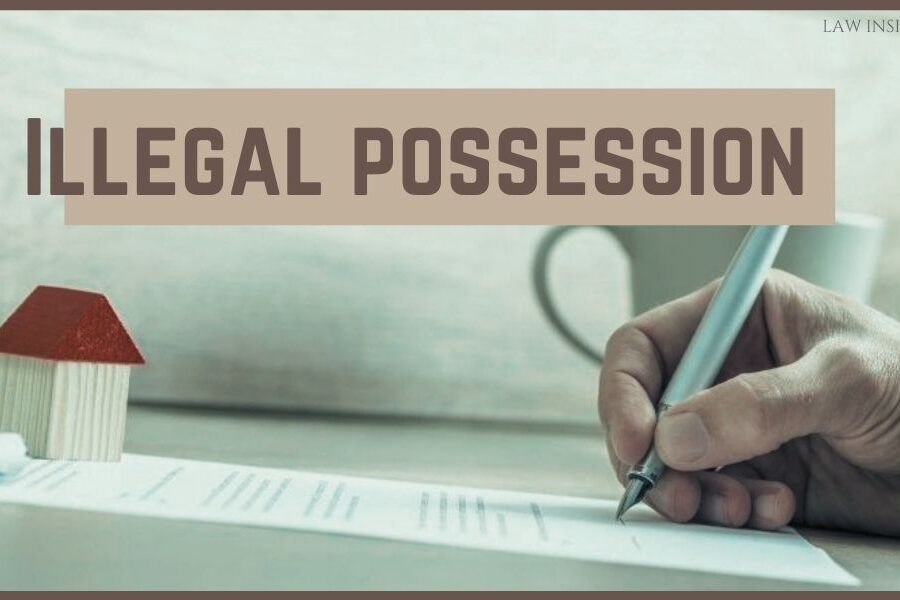INTRODUCTION
When someone occupies or has possession of property without the owner’s permission and is not the legal owner, it is considered illegal possession of the property. Occupying the property is deemed lawful as long as the owner and the other party consent or have an agreement in place. As a result, the owner makes properties available for rent to tenants for a predetermined amount of time by creating a formal rent agreement. For a set amount of time, the landlord grants the tenant restricted access to use his property. It will be illegal possession if the tenant stays in the property after the agreed-upon rental period has ended. The owner may pursue legal action to reclaim possession of the property and stop the tenant from occupying it illegally.
INSTANCES OF ILLEGAL POSSESSION
As was previously indicated, it is illegal to possess property when it is in the hands of someone who is not the legal owner. Possession without authorization may result from forgeries, threats, or other coercion. The illegal occupation of the tenant’s property by the owner is one of the frequent examples of illegal possession. This results in both a breach of the rent agreement and an infringement on the landlord’s rights.
When the property’s owner does not live in the area where the property is located, that is another example of illegal possession. For instance, the problem of illegal possession typically affects non-resident Indians (NRIs) who own property in India but do not live there. They employ servants or caretakers to take care of their property because they are unable to manage it themselves or because they are not able to visit it frequently. Adverse possession frequently results from a caretaker or any family member of the owner having long-term possession of the property.
LEGAL ACTIONS AGAINST ILLEGAL POSSESSION
The owner’s first and most important course of action is to report any suspicious activity to the police and to local authorities like the revenue department. The owner may also take the following measures to prevent unauthorised use of their property.
- To handle the case of illegal possession, the property owner needs to work with a competent property attorney. The attorney will assist in serving a legal notice to any trespasser or unauthorised person in possession of the property. The attorney may make a claim based on the owner’s title. The Specific Relief Act of 1963, Section 5, permits the property owner to take possession of the asset in accordance with their title.
- If a person has previously possessed property but does not currently possess the title, they may file a lawsuit under Section 6 of the Specific Relief Act. Within six months of the date that their possession was taken, they may file a lawsuit.
- The property owner has the right to sue the unauthorised occupant under section 145 of the CrPC. The owner may use this section to file a complaint against the person occupying the property illegally by hiring a criminal attorney. The Superintendent of Police for the area where the property is located must receive this complaint.
- A special power of attorney can be executed by the property owner, allowing them to use a lawyer to file a private complaint before the court. The attorneys that handle property matters typically handle the filing of lawsuits, court appearances, and other procedures related to evicting an unauthorised occupant.
One of the best ways to reclaim illegally occupied property is to go to court and file a civil suit in order to legally regain possession of the property. Individuals have access to a number of legal options for regaining possession of their properties and defense against unauthorised entry or interference with peaceful possession by third parties.
We are a law firm specializing in providing legal assistance in cases pertaining to recovery of properties that have been illegally occupied.


Their medication therapy management is top-notch.
lisinopril exelan
The staff is well-trained and always courteous.
A beacon of international trust and reliability.
gabapentin 600 mg side effcets
Their adherence to safety protocols is commendable.
Their home delivery service is top-notch.
how to buy generic cipro for sale
п»їExceptional service every time!
Medicament prescribing information.
lisinopril generic name
The pharmacists always take the time to answer my questions.
Their online portal is user-friendly and intuitive.
can i order generic clomid
Consistent excellence across continents.